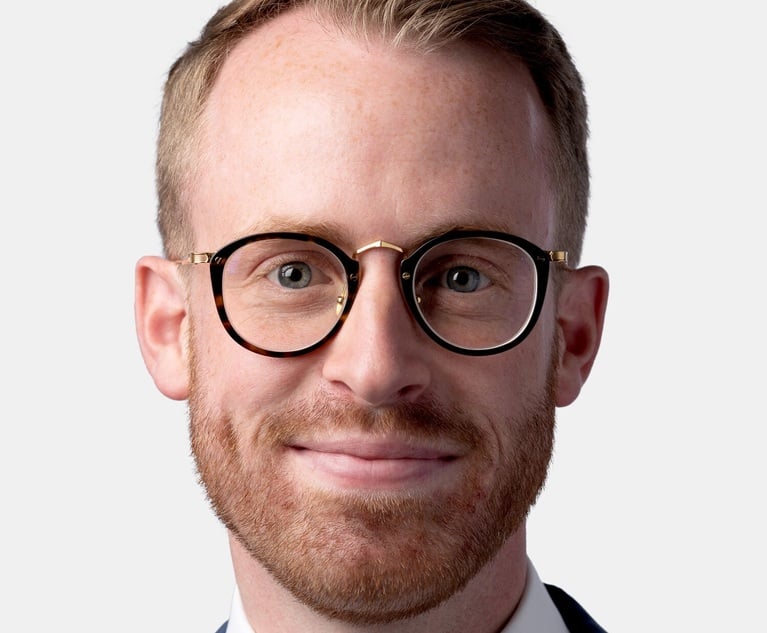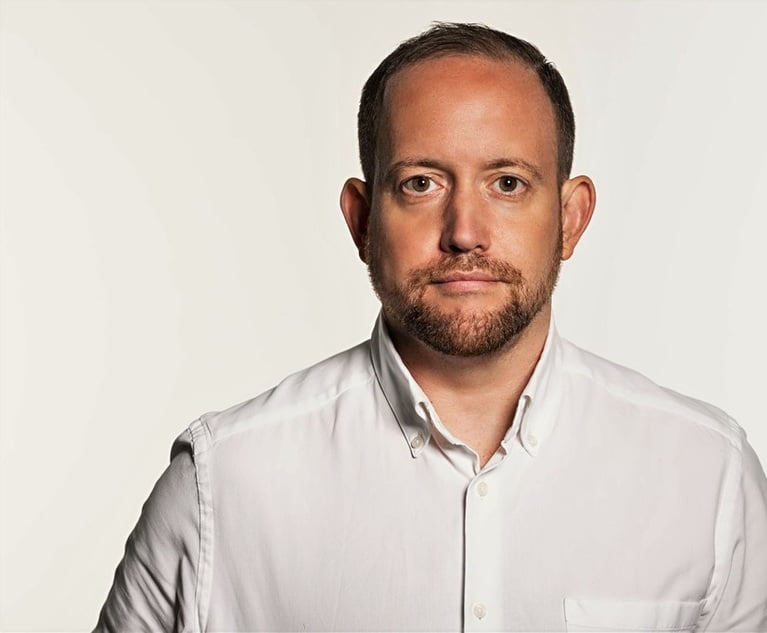The Coke side of in-house life
Advising the world's most famous global brand for three decades is no mean feat. Christopher Barnard has worked in almost every legal role, in almost every jurisdiction for Coca-Cola since 1978 and still has a thirst for more.Always excited by his work with the brand, he says: "As you might expect, Coca-Cola is a very creative business and a great company to work in. The demanding work keeps the adrenalin running and it is constantly evolving - it keeps you on your toes."Barnard joined the company in a management role and his career has developed over the last 30 years to the point that he is now the group general counsel for Coca-Cola Europe.
November 05, 2008 at 08:07 PM
7 minute read
 Christopher Barnard of Coca-Cola believes that staying at the same company can still be refreshing. Leigh Jackson reports
Christopher Barnard of Coca-Cola believes that staying at the same company can still be refreshing. Leigh Jackson reports
Advising the world's most famous global brand for three decades is no mean feat. Christopher Barnard has worked in almost every legal role, in almost every jurisdiction for Coca-Cola since 1978 and still has a thirst for more.
Always excited by his work with the brand, he says: "As you might expect, Coca-Cola is a very creative business and a great company to work in. The demanding work keeps the adrenalin running and it is constantly evolving – it keeps you on your toes."
Barnard (pictured) joined the company in a management role and his career has developed over the last 30 years to the point that he is now the group general counsel for Coca-Cola Europe.
In his time with the company he has worked in Asia, Australia and Europe, witnessing the growth of Coca-Cola both as a company and a global brand.
 Barnard believes that the work of lawyers has played a key role in the development and the continuing success of the company.
Barnard believes that the work of lawyers has played a key role in the development and the continuing success of the company.
He says: "Because of our position alongside the business, we get to learn about everything that is going on. We are part of the management team. It has always been the philosophy at Coca-Cola."
Barnard (pictured) adds: "We are imbedded in the business and practise preventative law, dealing with matters before they become issues. It is very important for the company, governance and brand reputation."
Despite the difficult financial climate, the company has continued to thrive. Earlier this month Coca-Cola reported third-quarter profit growth of 14%, with strong gains in emerging markets such as Brazil, Russia, Turkey and China.
Given its high international profile, Coca-Cola has no trouble attracting and retaining lawyers. The soft drinks manufacturer has around 330 legal staff, of whom 160 to 170 are qualified lawyers. Barnard's 40-strong European function is home to 25 lawyers, many of whom have built careers at the company over a number of years.
Barnard believes that the prestige of Coca-Cola and the trust given to the company's legal staff is crucial to retention.
"The company has a low turnover of lawyers; they tend to stay with the company for a long time," he says. "Coca-Cola is an exciting place to work – the environment is stimulating and the lawyers work autonomously and find their roles interesting and varied."
Accordingly, the company has to make sure that any new lawyers hoping to be part of the Coca-Cola legal team have the appropriate skills and the right working mentality.
He says: "A key difference between private practice and in-house is the ability to convert the law into its practical application. Not all lawyers are comfortable in that world. In-house, you are living with the client and the advice."
Barnard adds: "Coca-Cola looks at people who have commercial qualities and are interested in business and the company, of course, and, most importantly, making a contribution."
Always zealous in pursuing the company's interests, the Coca-Cola legal team is as exacting in choosing outside counsel as it is in picking in-house lawyers.
Barnard says: "In choosing law firms it is all about value and expertise. Having a senior partner charging astronomical fees which are not commensurate with value being delivered is no longer sustainable. In terms of fees, there must be a place for both fixed-fee and hourly rates."
As a global entity the company does not operate a strict legal panel, allowing regional general counsel to decide which firms fit best with the issues they face in their jurisdictions.
However, as Barnard recalls, the company made an attempt at putting together a global panel, which proved to create more problems than it solved.
"We did try once to form a global panel of law firms; it was based on the larger US firms with international offices, but in the end it turned out not to be practical," he observes.
"There were firms we had done business with locally for many years and there was no real benefit in using a US firm just because they had an office in, say, Beijing. We tend to steer ourselves towards who is better placed in a particular market for our particular needs."
Like other global brands such as Microsoft, Coca-Cola places diversity among its key criteria when deciding which firms to choose.
Barnard explains that the lead on diversity is taken from the US and is used as a yardstick both internally and externally.
"We take diversity very seriously," he says. "This is an important criteria in our selection of law firms. But diversity extends to our workforce as well."
He adds: "For example, our London office staff of 13 is made up of eight different nationalities and roughly a 50/50 gender split. As a global function we are also measured against our criteria for diversity as a performance metric."
However, the promotion of diversity is not the only thing that the US has led the way on in the in-house market. Having been an in-houser for 30 years, Barnard has seen the role of the general counsel develop.
"Traditionally, non-US in-house lawyers would be waiting for work to come to them rather than taking a more proactive approach," Barnard says. "It is my impression that in a sense they were not really engaged in the business. They may as well have been outside counsel."
Barnard argues that while at Coca-Cola he has always been encouraged to take proactive and preventative steps in his approach, this is not always done by other companies in other jurisdictions.
Barnard says: "In US companies lawyers have always been well-integrated into the business, whereas in non-US companies in-house lawyers were often treated more like private practitioners, but I can see that this is changing."
He adds: "However, I think this has changed enormously in recent years, particularly with the emergence of greater corporate governance requirements, which has led to more recognition of in-housers and the role they play. So to be effective they are now closer to the business and valued as advisers."
The role, according to Barnard, has evolved into a post much like his own at Coca-Cola, where the business and the lawyers work so closely that they even switch sides.
"Sometimes we are asked to give strategic advice and are often asked: 'what do you think?' Giving advice to the business is interesting for lawyers and I think we are valued and involved both for our analytical skills and objectivity," Barnard says.
Despite the role of in-house lawyers changing around him, Barnard's enthusiasm for his chosen field and for all things Coca-Cola has not.
This content has been archived. It is available through our partners, LexisNexis® and Bloomberg Law.
To view this content, please continue to their sites.
Not a Lexis Subscriber?
Subscribe Now
Not a Bloomberg Law Subscriber?
Subscribe Now
NOT FOR REPRINT
© 2025 ALM Global, LLC, All Rights Reserved. Request academic re-use from www.copyright.com. All other uses, submit a request to [email protected]. For more information visit Asset & Logo Licensing.
You Might Like
View All

Workload and Getting It All Done Top Challenges for In-house Counsel: Survey
4 minute read
Amazon Corporate Counsel in Brussels Returns to US Firm in ‘Boomerang Hire’
2 minute read
Former Miral GC Brings Commercial Insight to BCLP’s Middle East Real Estate Practice
4 minute readTrending Stories
- 1AIAs: A Look At the Future of AI-Related Contracts
- 2Litigators of the Week: A $630M Antitrust Settlement for Automotive Software Vendors—$140M More Than Alleged Overcharges
- 3Litigator of the Week Runners-Up and Shout-Outs
- 4Linklaters Hires Four Partners From Patterson Belknap
- 5Law Firms Expand Scope of Immigration Expertise, Amid Blitz of Trump Orders
Who Got The Work
J. Brugh Lower of Gibbons has entered an appearance for industrial equipment supplier Devco Corporation in a pending trademark infringement lawsuit. The suit, accusing the defendant of selling knock-off Graco products, was filed Dec. 18 in New Jersey District Court by Rivkin Radler on behalf of Graco Inc. and Graco Minnesota. The case, assigned to U.S. District Judge Zahid N. Quraishi, is 3:24-cv-11294, Graco Inc. et al v. Devco Corporation.
Who Got The Work
Rebecca Maller-Stein and Kent A. Yalowitz of Arnold & Porter Kaye Scholer have entered their appearances for Hanaco Venture Capital and its executives, Lior Prosor and David Frankel, in a pending securities lawsuit. The action, filed on Dec. 24 in New York Southern District Court by Zell, Aron & Co. on behalf of Goldeneye Advisors, accuses the defendants of negligently and fraudulently managing the plaintiff's $1 million investment. The case, assigned to U.S. District Judge Vernon S. Broderick, is 1:24-cv-09918, Goldeneye Advisors, LLC v. Hanaco Venture Capital, Ltd. et al.
Who Got The Work
Attorneys from A&O Shearman has stepped in as defense counsel for Toronto-Dominion Bank and other defendants in a pending securities class action. The suit, filed Dec. 11 in New York Southern District Court by Bleichmar Fonti & Auld, accuses the defendants of concealing the bank's 'pervasive' deficiencies in regards to its compliance with the Bank Secrecy Act and the quality of its anti-money laundering controls. The case, assigned to U.S. District Judge Arun Subramanian, is 1:24-cv-09445, Gonzalez v. The Toronto-Dominion Bank et al.
Who Got The Work
Crown Castle International, a Pennsylvania company providing shared communications infrastructure, has turned to Luke D. Wolf of Gordon Rees Scully Mansukhani to fend off a pending breach-of-contract lawsuit. The court action, filed Nov. 25 in Michigan Eastern District Court by Hooper Hathaway PC on behalf of The Town Residences LLC, accuses Crown Castle of failing to transfer approximately $30,000 in utility payments from T-Mobile in breach of a roof-top lease and assignment agreement. The case, assigned to U.S. District Judge Susan K. Declercq, is 2:24-cv-13131, The Town Residences LLC v. T-Mobile US, Inc. et al.
Who Got The Work
Wilfred P. Coronato and Daniel M. Schwartz of McCarter & English have stepped in as defense counsel to Electrolux Home Products Inc. in a pending product liability lawsuit. The court action, filed Nov. 26 in New York Eastern District Court by Poulos Lopiccolo PC and Nagel Rice LLP on behalf of David Stern, alleges that the defendant's refrigerators’ drawers and shelving repeatedly break and fall apart within months after purchase. The case, assigned to U.S. District Judge Joan M. Azrack, is 2:24-cv-08204, Stern v. Electrolux Home Products, Inc.
Featured Firms
Law Offices of Gary Martin Hays & Associates, P.C.
(470) 294-1674
Law Offices of Mark E. Salomone
(857) 444-6468
Smith & Hassler
(713) 739-1250








